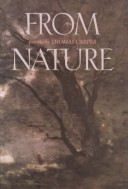Johns Hopkins: Poetry and Fiction
1 total work
The fifty-nine poems in Thomas Carper's newest collection start at the beginning--childhood--and move from the concrete to the more abstract problem of presenting reality through artistic expression. A master of traditional forms, Carper aims throughout to achieve a certain imaginative hold on things. Praise for Thomas Carper's 'Fiddle Lane:' "A superb technician, Carper manages the demanding form with an ease, a late-20th-century naturalness, that can cause a reader to forget that the flowing, witty experience he is enjoying is happening in a tight formal structure that dates from the late Middle Ages...These sonnets flow, so well in fact that once inside the poem readers must slow themselves down to catch the comedy, feel the lightness, the pathos, the wit. The poet won't do it for you, and that is the mark of his skill."--'Kennebec' "Especially for those who enjoy metrical and traditional verse, Carper's collection of poems...should prove a real treasure trove."--'Maine Sunday Telegram' "Carper's formal poems (mostly sonnets) give an outward order to inward wounds and wonders."
--'Beloit Poetry Journal' "Poetic forms never die, but there 'are' periods in which they become difficult to use effectively. Until I discovered Thomas Carper's work, I had considered the contemporary American sonnet a half-moribund form, a vehicle one might use--at some risk--for an individual poem but not as the foundation for an entire 'oeuvre.' But Carper has transfigured this problematic inheritance into an exciting, investigative form. With unusual skill and intelligence, Carper has brought curiosity and surprise back to the sonnet."--Dana Gioia
--'Beloit Poetry Journal' "Poetic forms never die, but there 'are' periods in which they become difficult to use effectively. Until I discovered Thomas Carper's work, I had considered the contemporary American sonnet a half-moribund form, a vehicle one might use--at some risk--for an individual poem but not as the foundation for an entire 'oeuvre.' But Carper has transfigured this problematic inheritance into an exciting, investigative form. With unusual skill and intelligence, Carper has brought curiosity and surprise back to the sonnet."--Dana Gioia
